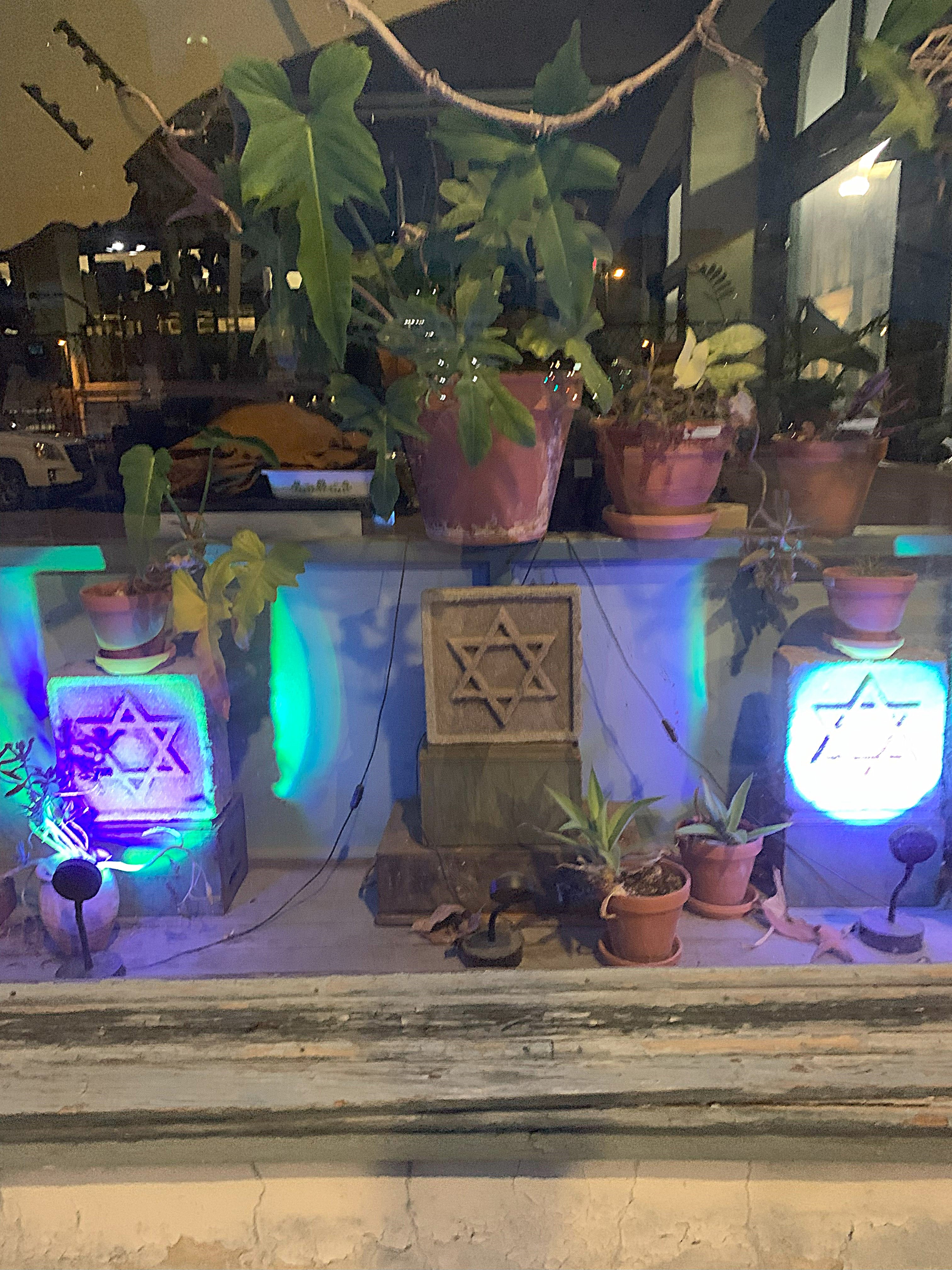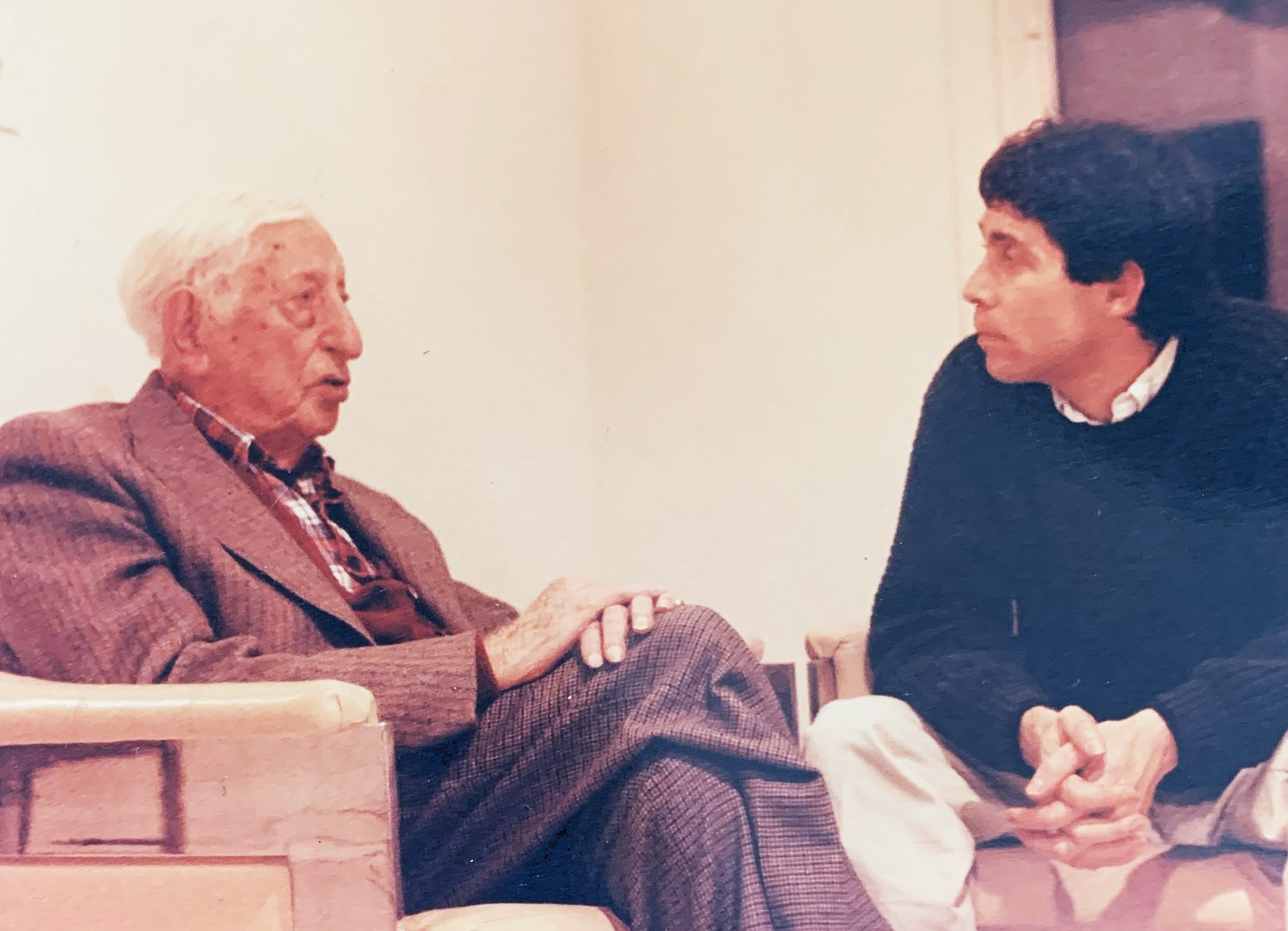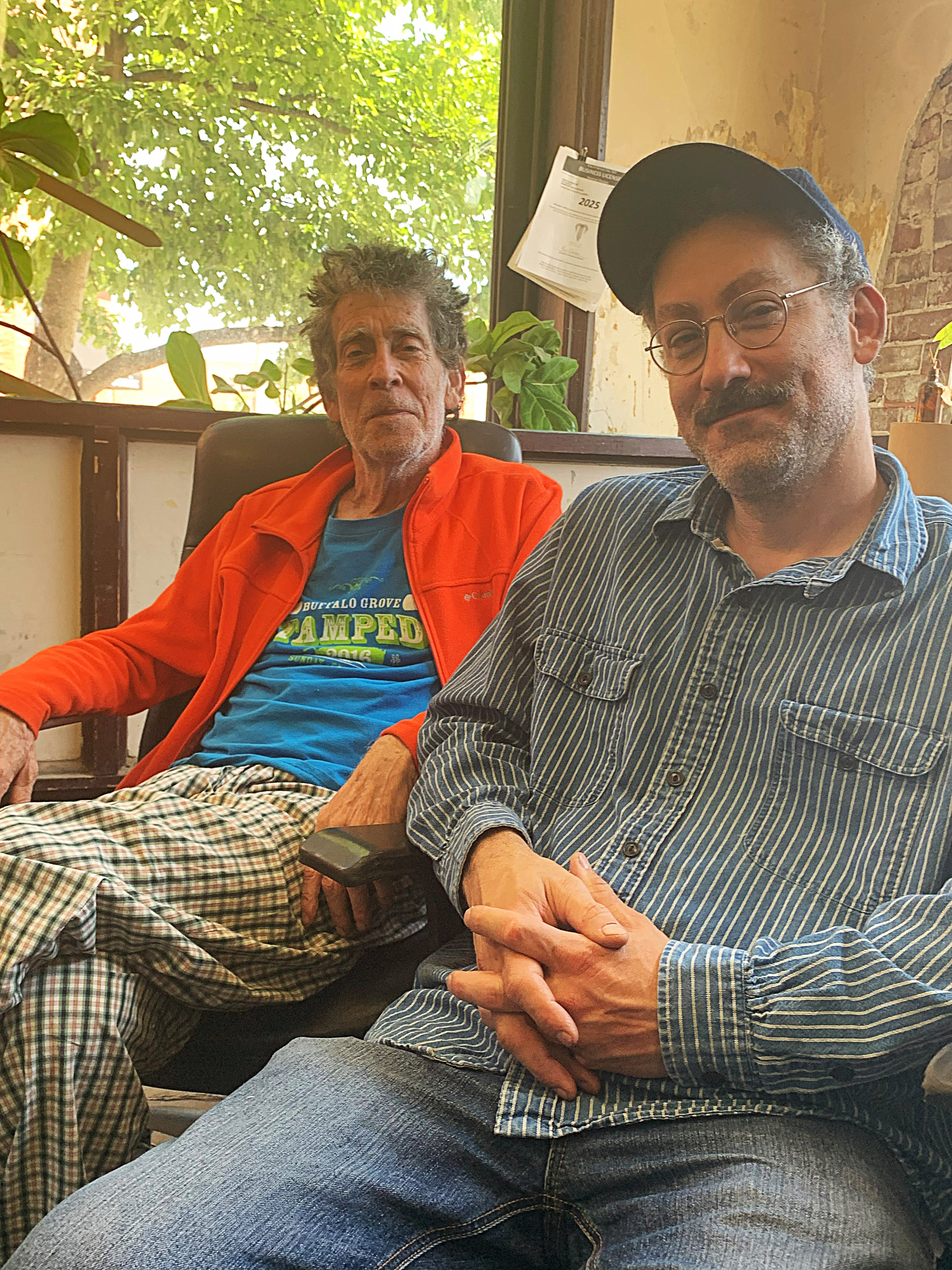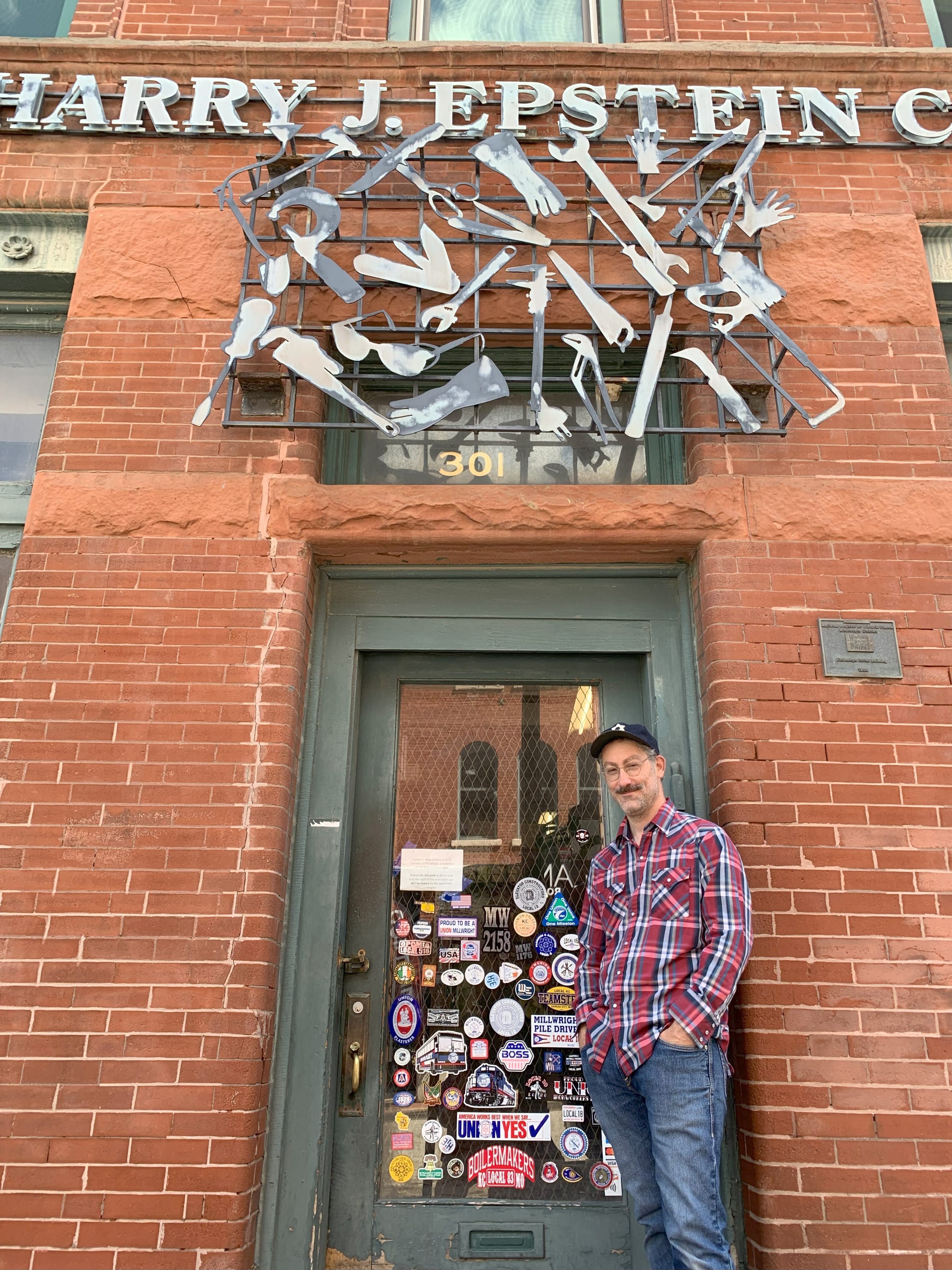In the heart of downtown Kansas City, a moving display of Jewish pride has captured the attention of passersby: three illuminated Stars of David prominently featured in the window of Harry J. Epstein Co.’s hardware shop.
The etched concrete blocks — salvaged from the ruins of a Kansas City synagogue torn down in the 1980s — are a proud declaration of identity for the Jewish family business founded by its namesake in the early 1930s.
Once surrounded by thriving, Jewish-owned businesses in the Garment District, the shop sells hand tools and other hardware out of its historic property, the Exchange Hotel Building at 301 W. 8th St.
Jori Sackin, Epstein’s great-grandson, represents the fourth generation of family ownership. Epstein died at age 100 in 1992, still working at the shop bearing his name on the last day of his life.
His great-grandson put the Star of David blocks on display following the Oct. 7, 2023, terrorist attacks on Israel – a demonstration of solidarity and pride, Sackin said, amid a historic surge in American antisemitism.
 Stars of David blocks illuminated in the window of Harry J. Epstein Co.
Stars of David blocks illuminated in the window of Harry J. Epstein Co.
“Displaying these blocks was this small, symbolic thing I could do,” Sackin, 45, said.
A trained painter and graduate of the Kansas City Art Institute, Sackin said the atrocities of Oct. 7 — and the wave of anti-Jewish hatred it unloosed — connected him more deeply with his Jewish identity.
He was “appalled” by the wave of antisemitic reactions that immediately followed Oct. 7, particularly in the progressive-minded circles in which he moved. Like many Jewish Americans, he felt a new connection to Israel and the Jewish people.
“Seeing the antisemitism playing out, watching the hostage posters be torn down, I wanted to do something,” he said.
That’s when Sackin remembered the Star of David bricks that his father, Steve Sackin, kept in his backyard in Brookside. They’d been sitting there since the early 2000s when Steve Sackin’s friend Ben Tarbe, owner of Ben Tarbe Used Brick, walked into Harry J. Epstein Co. one day and asked Sackin to take a drive with him.
They rode to a job site where Tarbe’s men had just knocked down a local synagogue (which one, the Sackins are not certain). Knowing Steve would appreciate the synagogue blocks, Tarbe pulled them from the rubble for his friend.
In a May 23 interview at his family’s store, Steve Sackin, 75, said he was proud of his son for creating the Star of David display.
“I’m glad we kept them,” he said of the ornate blocks.
Diagnosed with terminal brain cancer in August 2024, Sackin died at his Brookside home a few days after the interview, on May 28.
His son’s window display has been embraced by customers of all kinds, some of whom have stopped in to voice their support for Israel and the Jewish community. The shop has long been a melting pot where people find common ground.
“This business is kind of our life,” Steve Sackin said. “It’s an important part of who we are.”
There’s plenty of pancake-eating at the business, too. On the last Saturday each month, Jori Sackin’s fiancée, local artist Kimmon Smutz, cooks up free flapjacks for all who stop in.
Steve Sackin recalled how he and his family, including grandfather Harry Epstein, always found ways to adapt to changing times.
 An old photo of Harry J. Epstein and Steve Sackin. (Courtesy of the Sackin family)
An old photo of Harry J. Epstein and Steve Sackin. (Courtesy of the Sackin family)
Epstein, for example, had the foresight to invest in high-quality tools when they flooded the market following America’s post-WWII Lend-Lease program.
“He would always be a little bit ahead of everyone else in figuring out what to do, and that’s huge,” Jori Sackin said.
It’s those same American-made tools the family still sells to customers today.
“Iron workers, millwrights, carpenters, sheet metal guys, they all use really specific tools, and they like the good stuff — that’s what we sell,” Sackin said. “They don’t go to Home Depot and buy the cheap version of it — they’re relying on this tool every day.”
The shop has in recent decades been a favorite of construction contractors as well as local sculptors seeking out specialty tools. Adept at internet sales, the staff today does about half the store’s business online.
Business is good, thanks in part to the high-tech construction boom happening in and around Kansas City. Google and Meta are both building data centers here, while just 35 minutes away, Panasonic is putting up an electric vehicle battery plant in De Soto, Kansas. These projects and others require scores of skilled tradespersons, whose unions often recommend they buy their tools at Harry J. Epstein Co.
“It’s the greatest hardware store in the world,” said Jack Rees, 69, a customer since the early 1970s.
The story of how Harry Epstein wound up plying hand tools downtown begins in mid-19th Century Poland, then part of Czarist Russia.
Epstein’s father, Abraham Chmie-lewski, was born in 1858. A blacksmith by trade, he’d previously immigrated from Veisiejai, Lithuania. At a time of rabid Polish antisemitism, the tradesman worked hard to provide for his wife and several sons.
The Chmielewski’s saw their lives upended on March 13, 1881, when revolutionaries assassinated Russian emperor Czar Alexander II in St. Petersburg – a bombing for which Russia’s Jews were collectively blamed. Fueled by false antisemitic rumors, deadly pogroms swept the empire’s southern and western provinces from 1881 through 1884.
Fearing persecution, Chmielewski joined a historic wave of Jewish immigration to the U.S. He soon secured passage for his family to Ellis Island and built a new life for them in Kansas City. Somewhere along the way, Chmielewski was changed to Epstein.
Harry Epstein was born in Kansas City in 1892, the family’s first American-born child.
As a young entrepreneur, Epstein thought up various business ventures, including plans for a cattle farm in Argentina — for which he learned Spanish — and a roofing business in San Francisco, where the 1906 earthquake and fires had destroyed most of the city.
Neither business materialized, but Epstein kept churning out ideas.
In his 20s, he began buying and reselling sporting goods and other items he’d purchased through newspapers. Epstein opened a pawn shop in the 1920s and started the Liberty Frock Company, a garment business which failed. His breakthrough came in the surplus business, one of few commercial sectors open to U.S. Jews in the 1930s.
Sensing an opportunity, Epstein purchased large amounts of U.S. cavalry gear from the government, including horse saddles and stirrups. In his first major deal, he spent nearly all the family’s money on 30,000 cavalry spurs — a decision that upset his wife, Ellen, but ultimately proved a success and paved the way for future lucrative deals.
After opening his surplus shop at West 8th and Central Streets, Epstein purchased the old Exchange Hotel building — the business’ current home — around 1940. That was the Garment District’s heyday, when Jewish-owned clothing manufacturers and retailers lined the streets.
There was faith in the neighborhood, too. On Fridays, many Jewish-owned businesses closed up in time to attend Shabbat services.
“They were everywhere,” Steve Sackin said of Jewish garment-makers, recalling a vanished world. “Now, they’re all gone.”
By the 1970s, the district’s glory days were well behind it. Overseas manufacturing had decimated urban garment districts and, before long, big box stores were putting family hardware stores out of business.
Through it all, Epstein and his progeny carried on, finding new ways to sell their wares.
The founder’s son-in-law, attorney Eugene Sackin, helmed the shop once Epstein died. His son Ken Sackin joined the business in 1974, and his other son, Steve Sackin, came aboard in 1985. Now it’s Jori Sackin keeping the family business in the black.
 Steve Sackin and Jori Sackin, grandson and great-grandson of Harry J. Epstein.
Steve Sackin and Jori Sackin, grandson and great-grandson of Harry J. Epstein.
A few days before he died, Steve Sackin sat in the shop reflecting on business and life.
A lifelong adventure-seeker and writer, he’d filled 59 notebooks with original poetry starting in the 1970s and wrote about Judaism, spirituality, nature and his two favorite pastimes, mountain-climbing and gardening — with his wife, Linda, he built the garden at their longtime synagogue, Congregation Kol Ami.
Sackin recently published his first book of prose poems, with a second, posthumous book on the way. They can be purchased through harryepstein.com.
The Sackins ask that anyone wishing to make donations in Steve Sackin’s memory contribute to Manheim Gardens, which Steve helped found, at manheimgardens.org.



